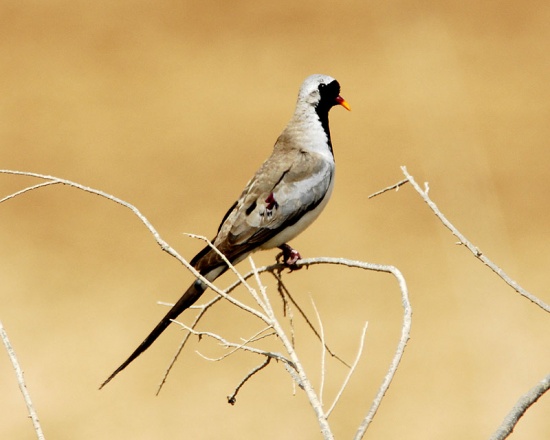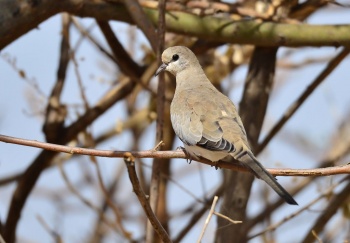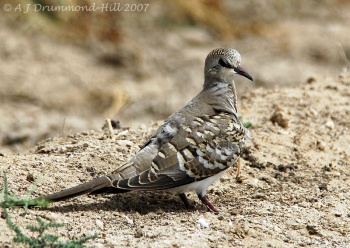(Clearer image of female, picture of subspecies. Attempt to disguise copied text. References) |
(Flight picture. Gallery created. References updated) |
||
| Line 31: | Line 31: | ||
They construct a stick nest in a bush. The clutch consists of 2 white eggs, which are incubated by the female for 16 days. | They construct a stick nest in a bush. The clutch consists of 2 white eggs, which are incubated by the female for 16 days. | ||
====Diet==== | ====Diet==== | ||
| − | |||
Their diet includes mainly small grass and herb seeds. | Their diet includes mainly small grass and herb seeds. | ||
| + | ==Gallery== | ||
| + | Click on photo for larger image | ||
| + | <gallery> | ||
| + | Image:20120905 080302.jpg|Male, Subspecies aliena<br />Photo by {{user|Dave+Clark|Dave Clark}}<br />Ankarana National Park, Northern [[Madagascar]], September 2012 | ||
| + | Image:Nam2a.jpg|Subspecies ''capensis''<br />Photo by {{user|ammadoux|ammadoux}}<br />Jizan highway, South of Jedddh, [[Saudi Arabia]], March 2018 | ||
| + | </gallery> | ||
==References== | ==References== | ||
| − | #{{Ref- | + | #{{Ref-Clements6thAug17}}#Handbook of the Birds of the World Alive (retrieved June 2017) |
#BF Member observations | #BF Member observations | ||
#Wikipedia | #Wikipedia | ||
Revision as of 21:39, 3 April 2018
- Oena capensis
Identification
28 cm (11 in)
- Black forehead, face, throat and front of breast, with narrow greyish-white edging
- Bluish-grey neck sides, remained of head, breast and wing-coverts
- White belly
- Chestnut primaries
- Long black tapered tail
- ellow and red bill
Female lacks the black and has a red-based grey bill
Young birds are similar to the female, but have dark blotches on the wings and shoulders.
Distribution
Sub-saharan Africa (with Madagascar), Socotra and the Arabian Peninsula.
Taxonomy
It is the only species in the genus Oena.
Subspecies
There are 2 subspecies[1]:
- O. c. capensis:
- O. c. aliena:
Habitat
Dry deciduous forest, brushland, scrub, semi desert and desert, savanna. Farm land, palm orchards, open woodland. Reed beds and brackish water.
Behaviour
Breeding
They construct a stick nest in a bush. The clutch consists of 2 white eggs, which are incubated by the female for 16 days.
Diet
Their diet includes mainly small grass and herb seeds.
Gallery
Click on photo for larger image
Male, Subspecies aliena
Photo by Dave Clark
Ankarana National Park, Northern Madagascar, September 2012Subspecies capensis
Photo by ammadoux
Jizan highway, South of Jedddh, Saudi Arabia, March 2018
References
- Clements, J. F., T. S. Schulenberg, M. J. Iliff, D. Roberson, T. A. Fredericks, B. L. Sullivan, and C. L. Wood. 2017. The eBird/Clements checklist of birds of the world: v2017, with updates to August 2017. Downloaded from http://www.birds.cornell.edu/clementschecklist/download/
- Handbook of the Birds of the World Alive (retrieved June 2017)
- BF Member observations
- Wikipedia
Recommended Citation
- BirdForum Opus contributors. (2025) Namaqua Dove. In: BirdForum, the forum for wild birds and birding. Retrieved 21 April 2025 from https://www.birdforum.net/opus/Namaqua_Dove
External Links








